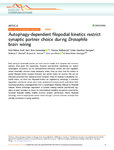2020-03-12Zeitschriftenartikel
Autophagy-dependent filopodial kinetics restrict synaptic partner choice during Drosophila brain wiring
Kiral, Ferdi Ridvan
Linneweber, Gerit Arne
Mathejczyk, Thomas
Georgiev, Svilen Veselinov
Wernet, Mathias F.
Hassan, Bassem A.
von Kleist, Max
Hiesinger, Peter Robin
Brain wiring is remarkably precise, yet most neurons readily form synapses with incorrect partners when given the opportunity. Dynamic axon-dendritic positioning can restrict synaptogenic encounters, but the spatiotemporal interaction kinetics and their regulation remain essentially unknown inside developing brains. Here we show that the kinetics of axonal filopodia restrict synapse formation and partner choice for neurons that are not otherwise prevented from making incorrect synapses. Using 4D imaging in developing Drosophila brains, we show that filopodial kinetics are regulated by autophagy, a prevalent degradation mechanism whose role in brain development remains poorly understood. With surprising specificity, autophagosomes form in synaptogenic filopodia, followed by filopodial collapse. Altered autophagic degradation of synaptic building material quantitatively regulates synapse formation as shown by computational modeling and genetic experiments. Increased filopodial stability enables incorrect synaptic partnerships. Hence, filopodial autophagy restricts inappropriate partner choice through a process of kinetic exclusion that critically contributes to wiring specificity.
Dateien zu dieser Publikation

